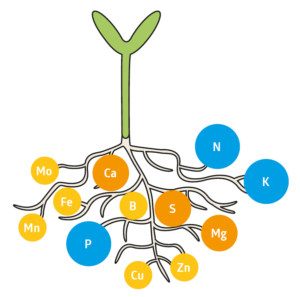All plant nutrients are essential for optimal growth
All plant need multiple types of nutrients to grow. However, they do not need equal amounts of the different nutrients. In this article we cover different types of nutrients and the importance of these nutrients to optimal plant growth.
Macro and micronutrients
We can divide nutrient into two types, based on the general plant needs. Nutrients that are required in greater quantities are called macronutriens. The following nutrients belong to this category: nitrogen, phosphorus, potassium, calcium, magnesium and sulfur.
Plants require Iron, boron, manganese, zinc, copper and molybdenum in smaller quantities. As a result, we these nutrients belong to the category of micronutrients. However, both macro and micronutrients are essential for plant growth.
 Vital plant nutrients
Vital plant nutrients
Now, let’s look closer at what each nutrient does and why plants need them.
Nitrogen (N) is essential for plant growth and crop formation, because it is a building block of many crucial compounds. You could compare what Nitrogen does for plants to what proteins do for the human body. Nitrogen promotes rapid growth and increases seed and fruit production.
Phosphorus (P) is required in photosynthesis and energy transport. Plants also use Phosphorus to store compounds and to develop roots. Phosphorus benefits and speeds up plant maturity and seed production.
Potassium (K) improves disease resistance, photosynthesis and the quality of seeds and fruit. High Potassium content reduces the unwanted stretching of plants.
Essential secondary plant nutrients
The following nutrients are essential as well, but needed in smaller quantities.
First of all, Calcium (Ca) is part of the signalling mechanisms that alert plants of environmental stress. Plants also require Calcium for strong shoot and root formation.
Furthermore, Magnesium (Mg) is essential for photosynthesis and protein synthesis. Many plant enzymes require Magnesium as an activator and component. As a result, Magnesium plays an important role in many plant processes.
Finally, Sulfur (S) is a building block of many other necessary compounds. It improves resistance to cold and helps reach vigorous growth.
Important micronutrients
As explained before, plants require micronutrients only in small doses. Let’s see what each micronutrient does:
- Iron (Fe) is necessary in photosynthesis.
- Boron (B) is essential for seed and fruit formation and helps in the use and regulation of other nutrients.
- Manganese (Mn) and Molybdenum (Mo) aid in nitrogen metabolism. Manganese is also part of the breakdown of carbohydrates.
- Zinc (Zn) aids in regulating plant growth and is part of carbohydrate metabolism.
- Copper (Cu) is required for reproductive growth and root metabolism.
Now we know what plants use all these nutrients for, it’s certainly clear to see why fertilising your plants is very important. Above all, it’s save to say nutrients are crucial to optimal growth.
Would you like to know more about the fertilisers Kekkilä Professional provides for horticultural use? Have a look at this page.

